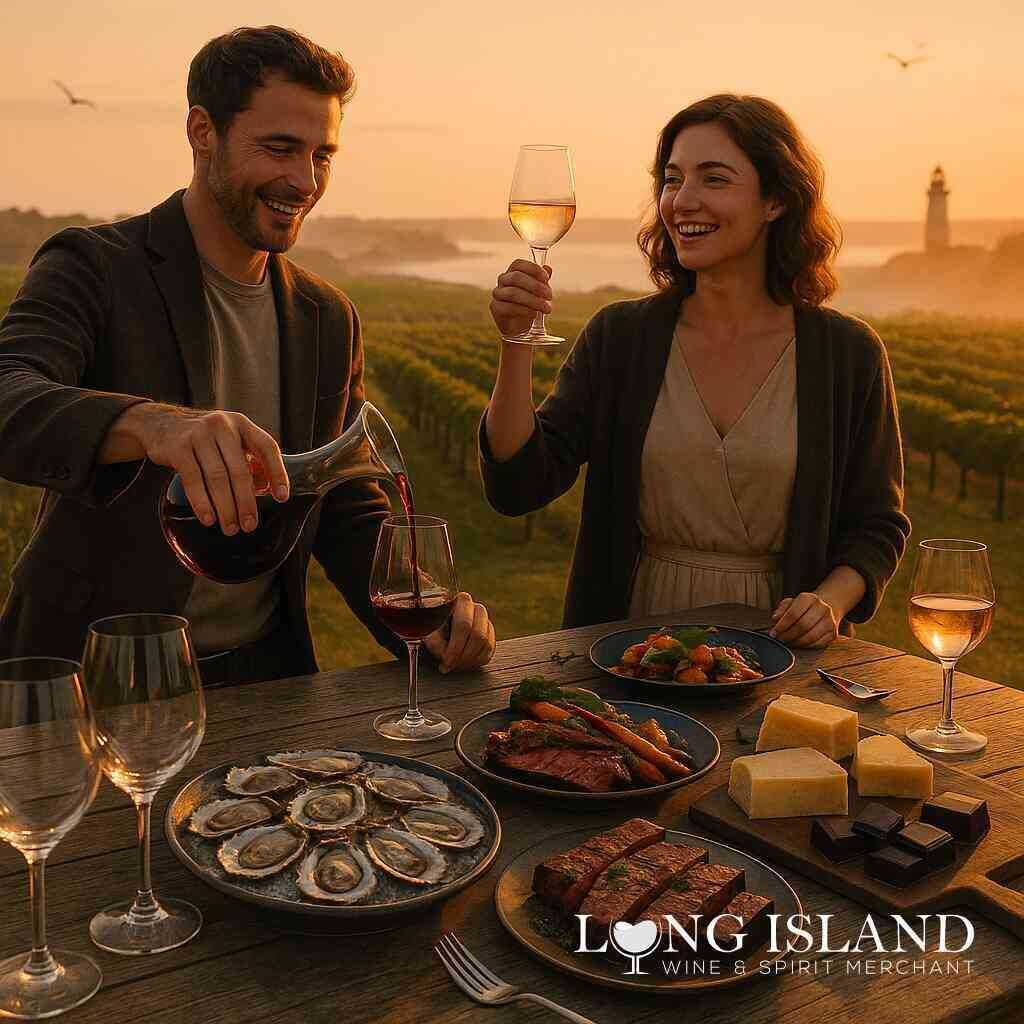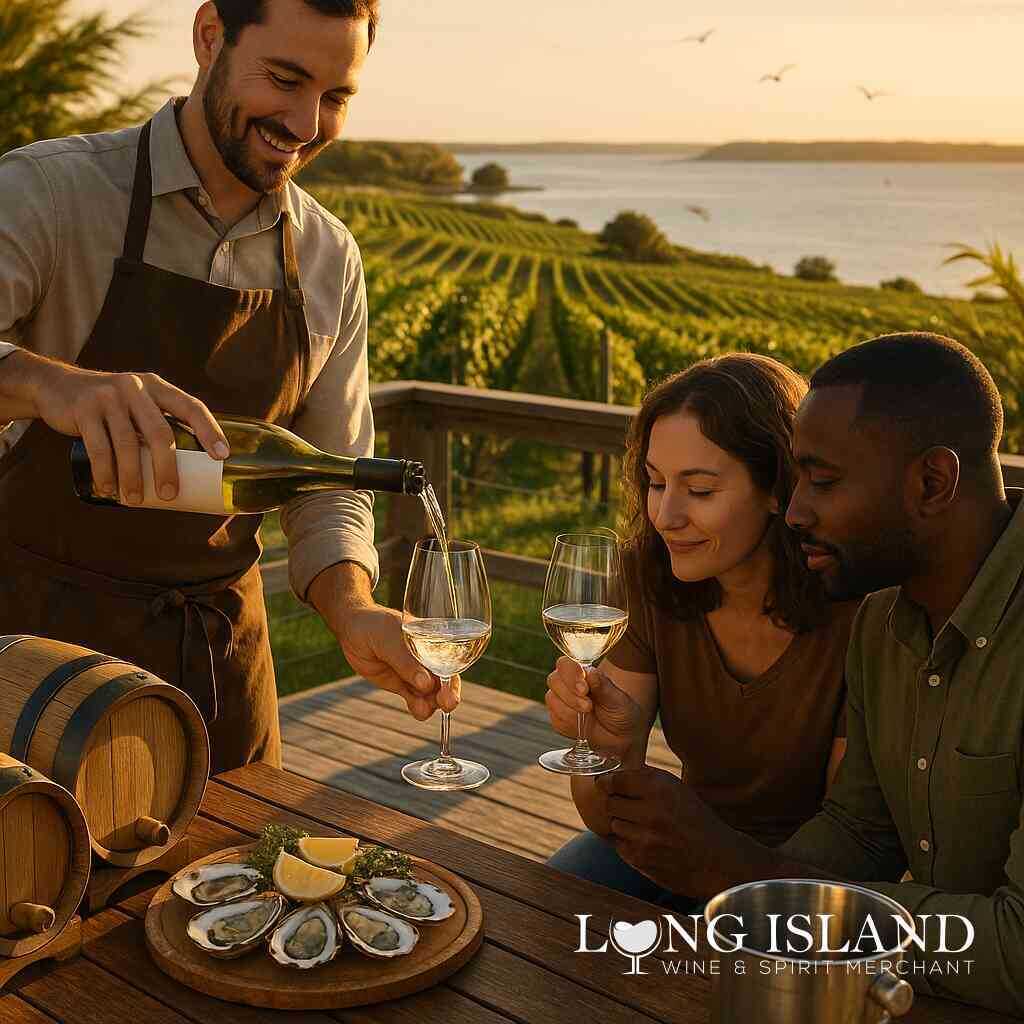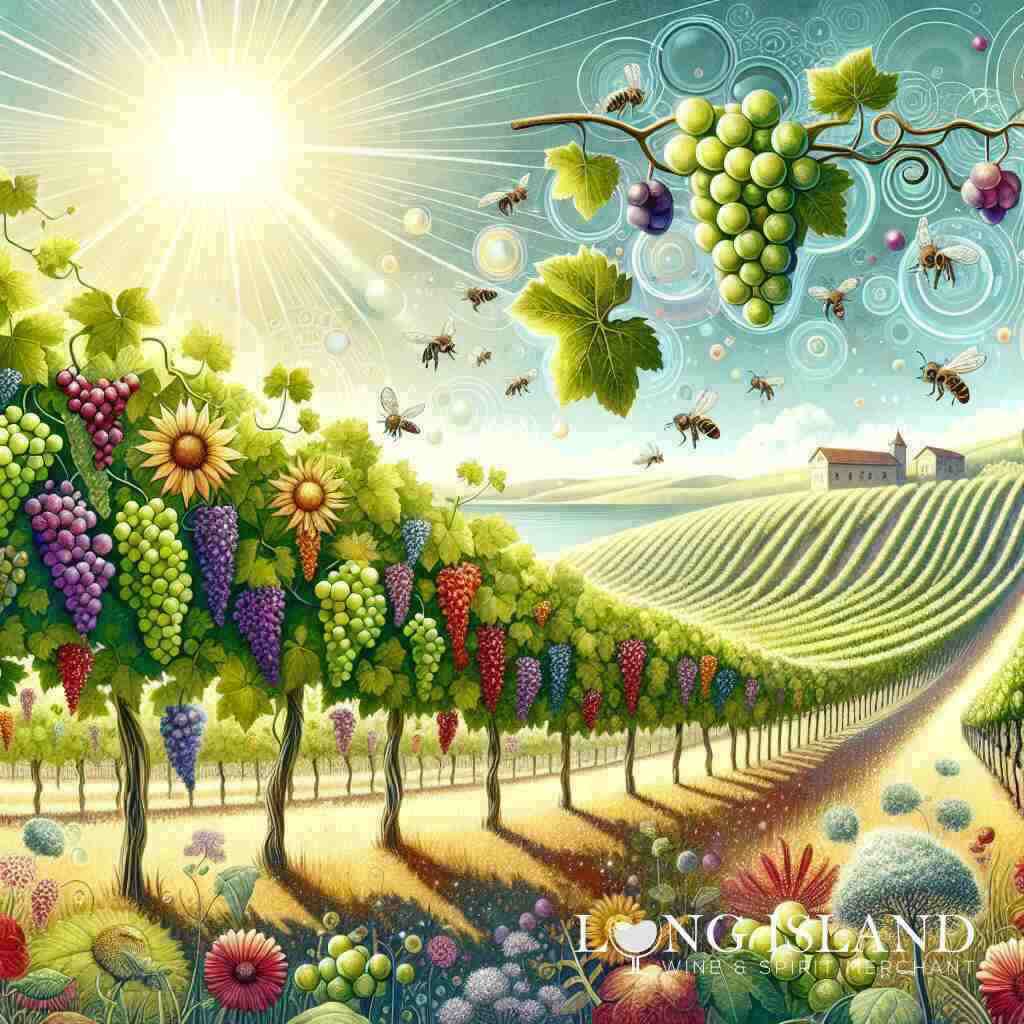
What Does Biodynamic Wine Really Mean?
July 27, 2024
Uncorking the Mystery of Biodynamic Wine
Defining Biodynamic Wine
Biodynamic wine goes beyond the basic tenets of organic viticulture, embedding itself in the philosophy that views the vineyard as a cohesive, self-sustaining system. This holistic approach involves a series of agricultural practices that are tuned to the natural rhythms of the earth, moon, and planets, aiming to enhance biodiversity, soil fertility, and crop nutrition. By abstaining from synthetic chemical inputs, biodynamic winemakers strive to produce wines that are a true expression of the terroir. The result? Wines that not only taste extraordinary but also encapsulate the essence of their environment.
Historical Roots of Biodynamic Farming
The concept of biodynamic farming traces back to the early 20th century, with Austrian philosopher Rudolf Steiner’s series of lectures in 1924. Steiner introduced a method of farming that encouraged the use of natural composts and herbal preparations to enhance soil health and plant growth. His innovative approach emphasized the farm as a singular organism, with each component – from the soil to the crops and livestock – functioning in harmonious balance. This groundwork laid by Steiner has since evolved, influencing not just agriculture but the viticultural practices that give birth to the finest biodynamic wines.
Biodynamic Wine vs Organic Wine
While biodynamic and organic wines share the common goal of eschewing synthetic chemicals, some distinctions set them apart. Organic wine focuses primarily on the elimination of artificial pesticides and fertilizers in the vineyard. Biodynamic wine, on the other hand, goes a step further by incorporating specific biodynamic preparations and adhering to a planting calendar that aligns with lunar and cosmic cycles. This integrated approach not only respects the earth but also seeks to invigorate and harmonize the vineyard’s ecosystem. Consequently, biodynamic winemaking is often seen as a more rigorous and spiritually infused extension of organic viticulture, offering a unique lens through which to appreciate the interconnectedness of nature and winemaking.
By exploring the rich tapestry of biodynamic wine, from its defining principles to its historical underpinnings and distinction from organic wine, enthusiasts and novices alike can gain a deeper appreciation for this eco-conscious approach to viticulture. Long Island Wine & Spirit Merchant, nestled in the heart of Commack, New York, stands at the forefront of this movement, inviting patrons to explore a meticulously curated selection of biodynamic wines. Each bottle tells a story of meticulous stewardship and a deep-seated respect for the land, promising an unrivaled tasting experience that transcends the ordinary.
The Vineyard as a Living Organism
Fundamentals of Biodynamic Farming
Biodynamic farming is a method that sees the vineyard as a living organism, complete and autonomous, a philosophy that envelopes the entire process from soil to sip. Central to this practice is the preparation and application of biodynamic composts and field preparations intended to enhance soil vitality and plant health. These preparations numbered 500 to 508, use ingredients such as fermented manure, minerals, and herbs to stimulate root growth, enhance the decomposition of organic matter, and promote microbial diversity in the soil. By treating the vineyard as a holistic entity, biodynamic farmers aim to create a balanced ecosystem that supports the growth of high-quality grapes and, by extension, the production of distinctive, vibrant wines. This reverence for the land aligns closely with the values held by Long Island Wine & Spirit Merchant, where the connection between the earth and the fine wine selection offered is sincerely acknowledged.
The Role of the Lunar Calendar
The role of the lunar calendar in biodynamic farming taps into ancient agricultural wisdom, guiding winemakers in timing their vineyard activities to the rhythms of the moon, stars, and planets. This celestial scheduling includes the best times to plant, prune, and harvest grapes, as well as when to apply the various biodynamic preparations. For instance, when the moon is descending, it’s considered an optimal time for root development, making it suitable for pruning to invigorate vine growth. Conversely, during the ascending moon phase, sap flow increases, favoring tasks such as grafting and planting. This meticulous attention to cosmic rhythms seeks not only to enhance vineyard vitality but also to imbue the wines with a unique depth and character that reflects the harmony between the vine and its cosmic environment.
Creating a Self-Sustaining Ecosystem
Biodynamic viticulture aims to create a self-sustaining ecosystem within the vineyard, one that reduces the need for external inputs by fostering a high degree of biodiversity. This approach includes integrating animals to graze between vine rows, thereby naturally controlling weeds and providing manure for compost. Cover crops are also grown to improve soil structure, add nutrients, and manage soil moisture levels. Hedgerows, wildflowers, and insect hotels are introduced to attract beneficial insects and birds that prey on vine pests. This living tapestry enhances the resilience of the vineyard to pests and diseases, contributing to the production of healthier vines and grapes. It’s a testament to the belief that the more aligned with nature a farming practice is, the more terroir – the sense of place – can be expressed in the wine. At Long Island Wine & Spirit Merchant, the biodynamic wines in our wine rack embody this intricate balance and ecological stewardship, offering an invitation to experience the profound connection between the vineyard’s living ecosystem and the exquisite wines it yields.
From Soil to Sip: The Biodynamic Process
The Preparation of Biodynamic Composts
Biodynamic composting is the cornerstone of the biodynamic process, embodying the principle of returning what is taken from the earth back to it, enriched and revitalized. The process involves the creation of compost piles using organic farm materials-such as manure from pasture-fed animals, straw, and plant matter-which are then treated with biodynamic preparations. These preparations, specific to biodynamic farming, are made from fermented herbal and mineral substances that invigorate the compost and, in turn, the soil. The method transforms waste into a powerful, life-promoting substance, enhancing soil structure, fostering microbial diversity, and increasing fertility. This meticulous care in compost preparation reflects the dedication to nurturing the earth found at Long Island Wine & Spirit Merchant, where the value of a deep, tangible connection to the land is understood to be essential for producing fine wine and good spirits.
Biodynamic Pest Management
In biodynamic viticulture, the approach to pest management is inherently preventative, crafted to maintain the balance within the vineyard’s ecosystem and thereby reduce the occurrence of pest outbreaks. Rather than relying on synthetic chemicals, biodynamic farming employs natural predators, diversified plant species, and specific biodynamic preparations to create a resilient and automated environment. By encouraging birds, beneficial insects, and even livestock to participate in the vineyard’s ecology, these methods naturally mitigate pest issues. Moreover, the biodynamic calendar plays a role here as well, guiding the timing for interventions in a way that aligns with natural rhythms, thus maximizing their effectiveness. This commitment to ecological balance and respect for nature is a hallmark of biodynamic philosophy, and it is a testament to the sustainable practices championed by Long Island Wine & Spirit Merchant in their selection of biodynamic wines that honor the earth.
Harnessing the Energies of Nature
Biodynamic farming is distinct in its emphasis on the energetics of the vineyard, aiming to harmonize the terrestrial and cosmic forces that influence plant growth. This principle extends beyond the physical aspects of farming, incorporating an understanding of the vineyard as a living system that interacts with the energies of the moon, planets, and stars. Biodynamic preparations are applied according to a calendar that considers astronomical positions, which is believed to affect the efficacy of these treatments. For instance, certain days are deemed more favorable for sowing seeds, while others are preferred for harvesting based on lunar and planetary influences. This conscious alignment with the cosmos is thought to enhance the vitality of the vineyard and, consequently, the quality and character of the wine produced. At Long Island Wine & Spirit Merchant, this profound respect for the natural and cosmic order is mirrored in their curated selection of biodynamic wines, inviting patrons to experience the unique vibrancy and depth that such practices imbue in every bottle.
Understanding Biodynamic Certifications
Certification Bodies and Standards
Biodynamic wine certification is a testament to a vineyard or winery’s adherence to the rigorous standards set out by biodynamic agricultural methods. Unlike conventional farming, biodynamic agriculture incorporates organic practices but goes further by following a holistic approach that treats the vineyard as a self-sustaining ecosystem. This includes following the lunar calendar for planting and harvesting, using biodynamic preparations to enhance soil health, and maintaining biodiversity. Certification bodies, such as Demeter, the most recognized biodynamic certification organization globally, and Biodyvin, focus on certifying vineyards and wineries that meet these strict criteria. These institutions conduct comprehensive audits to ensure that each certified biodynamic wine producer practices agriculture that respects the earth and contributes to the vitality of the plant, soil, and ecosystem. Through Demeter’s standards, consumers can trust that the biodynamic label represents a profound commitment to sustainable and holistic farming practices, far surpassing the requirements for organic certification.
The Importance of Certification for Consumers
For wine enthusiasts and eco-conscious consumers, biodynamic certification offers a level of assurance that goes beyond the bottle. It signifies a commitment to ecological sustainability, holistic agricultural practices, and the production of wine in its most natural and unadulterated form. This assurance allows consumers to enjoy quality wines that reflect the true character of their terroir, knowing they are supporting environmentally responsible and ethically minded producers. Moreover, certification helps consumers navigate the often complex world of wine labels, providing an explicit identifier for wines produced under biodynamic standards. This transparency is essential in fostering trust between producers and consumers, highlighting the producer’s dedication to not only exceptional wine quality but also to beneficial environmental practices. As more individuals seek out sustainable and eco-friendly products, biodynamic certification becomes a pivotal factor in their wine selection process, guiding them toward choices that align with their values.
Biodynamic Wine Certification on Long Island
Long Island, a region celebrated for its vibrant wine culture, is home to select vineyards that have embraced biodynamic farming, marking a shift towards more sustainable viticulture practices in the area. The movement towards biodynamic certification among Long Island wine producers reflects a growing acknowledgment of the benefits these practices offer, not just for the environment but for the wine itself. Biodynamic wines from Long Island are gaining recognition for their quality and unique expression of the local terroir, attributed to the meticulous, earth-friendly practices employed in their production. With a focus on enhancing biodiversity, soil vitality, and ecological balance, Long Island’s biodynamic vineyards serve as models for sustainable agriculture. Their commitment to biodynamic principles, validated by certification, represents a promise of purity and quality to consumers, offering a distinct and meaningful wine-tasting experience. At Long Island Wine & Spirit Merchant, patrons can explore an exquisite selection of biodynamic wines, each carrying the hallmark of eco-conscious craftsmanship reflective of the region’s rich agricultural heritage and innovation.
Our Selection of Biodynamic Wines
At Long Island Wine & Spirit Merchant, we proudly curate a collection of biodynamic wines that vividly express the unique characteristics of their respective terroirs. Biodynamic viticulture, with its strict adherence to sustainable, holistic practices, yields wines of exceptional purity and depth. Our shelves are lined with bottles that tell the story of their origins, from sun-drenched hillsides to cool, mineral-rich valleys. Each wine, whether a robust red, a crisp white, or a delicate rosé, stands as a testament to the dedication of winemakers who operate in harmony with nature. We invite you to explore our selection of biodynamic wines, confident that each bottle offers not just a drink but an experience that connects you to the earth.
How Biodynamic Practices Influence Flavor Profiles
The philosophy behind biodynamic wine production emphasizes the interconnectedness of the vineyard’s ecosystem. By aligning agricultural practices with lunar cycles and treating the soil and vines with specially prepared herbal and mineral concoctions, biodynamic winemakers create a vibrant environment for vines to thrive. This attention to the natural balance results in grapes that are not only organically pure but also imbued with the unique essence of their surroundings. This method of cultivation can lead to wines with more pronounced flavor profiles characterized by a profound sense of place. The absence of chemical interference allows the natural terroir to shine through, offering wine enthusiasts a taste that is as authentic as it is delightful.
Pairing Biodynamic Wines with Food
Biodynamic wines, with their distinct character and heightened expression of terroir, lend themselves beautifully to food pairing. The nuanced flavors and aromas, a direct result of the eco-conscious farming practices, can elevate a dining experience. For instance, a biodynamically grown Pinot Noir, with its subtle earthy notes, pairs exquisitely with mushroom dishes or roasted meats, enhancing the savory flavors. A vibrant biodynamic Sauvignon Blanc, on the other hand, might complement a fresh goat cheese salad or a light seafood dish, its crisp acidity balancing the meal. At Long Island Wine & Spirit Merchant, we understand the art and science behind wine pairing. Encouraging our patrons to explore this collaboration, we offer insights and recommendations on how best to enjoy our biodynamic wine selection alongside your favorite dishes, making every meal an occasion to remember.
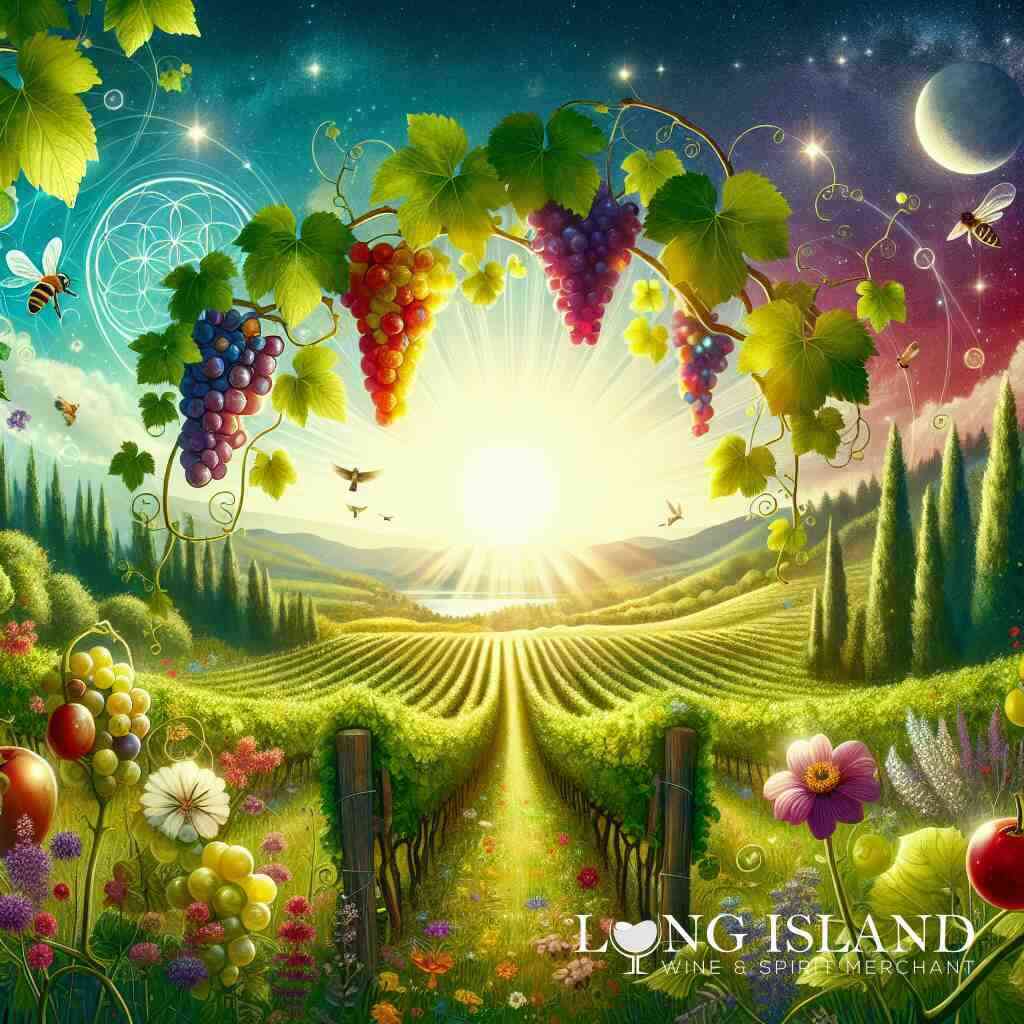
The Environmental Impact of Biodynamic Vineyards
Sustainable Wine Production
Biodynamic vineyards stand as a paradigm of sustainable wine production, embodying a commitment to nurturing the earth and fostering ecological balance. These practices diverge significantly from conventional viticulture by eliminating reliance on synthetic inputs and embracing methods that regenerate the soil and surrounding ecosystems. At the heart of biodynamic wine production is the principle of working with nature rather than against it. This includes employing biodynamic preparations made from herbs, minerals, and manure to invigorate the soil and practicing crop rotation and cover cropping to enhance soil health and biodiversity. By focusing on sustainable approaches, biodynamic vineyards contribute to reducing the carbon footprint associated with wine production, offering not merely a product but a vision for the future of agriculture. Their commitment to sustainability aligns with the ethos of eco-conscious consumers and retailers, including establishments like Long Island Wine & Spirit Merchant, who prioritize wines that honor the environment.
Benefits to the Ecosystem
Biodynamic vineyards offer extensive benefits to the ecosystem, creating habitats for a variety of organisms and bolstering biodiversity. This form of agriculture treats the vineyard as a living system that is interconnected with the broader landscape. By fostering a diverse ecosystem, biodynamic practices encourage the presence of beneficial insects, birds, and other wildlife, which play crucial roles in pest management and pollination. Additionally, the use of organic materials and composts enriches the soil, enhancing its ability to sequester carbon and mitigate climate change. The holistic approach extends to water management as well; biodynamic farms often employ natural water retention practices that minimize erosion and runoff, thereby protecting local waterways. These eco-friendly practices underscore the symbiotic relationship between viticulture and the environment, exemplifying how agriculture can contribute positively to the well-being of our planet.
Biodynamic Farming as a Response to Climate Change
In the face of escalating climate change, biodynamic farming emerges as a proactive and resilient approach to viticulture. By emphasizing soil health, biodiversity, and ecological equilibrium, biodynamic vineyards are better equipped to withstand the extremes of climate variability, from droughts to heavy rainfall. The organic matter in healthy, biodynamically farmed soils acts like a sponge, enhancing the land’s capacity to retain water during dry spells and absorb excess water during floods. These vineyards often benefit from a more stabilized microclimate, which is crucial for consistent grape quality and, consequently, wine production. Moreover, the carbon sequestration capabilities of biodynamically managed soils contribute to the mitigation of greenhouse gas emissions, underscoring the role of sustainable agriculture in combating climate change. Through these practices, biodynamic wine production not only adapts to environmental challenges but also actively participates in the global effort to foster a more sustainable future for our planet.
Artisanal and Holistic: The Culture of Biodynamic Wine
The Artisanal Approach to Wine Making
Biodynamic winemaking is not just a process but an art form rooted in ancient traditions and holistic practices. The artisanal approach to wine-making emphasizes handcrafted quality and meticulous attention to detail, where every step, from soil preparation to bottling, is done with utmost care and respect for the environment. Unlike mass-produced wines, biodynamic wines are the product of a winemaker’s close connection to the land, guided by cycles of the moon and the stars. This time-honored method results in wines that are not only superior in taste but also rich, embodying the unique essence of their terroir. At Long Island Wine & Spirit Merchant, the curated selection includes wines created through these artisanal practices, offering connoisseurs a taste of purity and excellence.
Holistic Practices in the Vineyard
Biodynamic viticulture goes beyond simply avoiding synthetic chemicals; it embraces a holistic view of agriculture where the vineyard is considered a living organism. This means understanding and fostering the complex relationships between soil, plants, animals, and the cosmos. Holistic practices may include using biodynamic preparations to nourish the soil, employing techniques that enhance biodiversity, and timing agricultural activities to coincide with lunar and planetary rhythms. This deep connection to nature ensures that the vineyard thrives in harmony with its surroundings, producing grapes that are vibrantly healthy and expressive. At the heart of Long Island Wine & Spirit Merchant’s biodynamic offerings is this reverence for holistic vineyard management, reflecting a commitment to sustainable stewardship and the production of wines that genuinely resonate with nature.
The Community of Biodynamic Wine Producers
The biodynamic wine movement is supported by a dedicated community of farmers, winemakers, and enthusiasts who share a common vision of sustainability and ecological harmony. These producers are often part of broader networks that foster collaboration, knowledge sharing, and support. Certification bodies like Demeter and Biodyvin not only serve to verify adherence to biodynamic principles but also to connect members of this vibrant community, enabling them to advance the practice of biodynamic viticulture collectively. This sense of community is crucial, as it provides a support system for those committed to this demanding yet rewarding approach to winemaking. Long Island Wine & Spirit Merchant celebrates this community, offering a platform where the fruits of their labor can be appreciated and enjoyed by a wider audience. Events and partnerships underscore the importance of these artisanal producers in shaping the future of sustainable and quality wine production, inviting everyone to explore the depth and diversity of biodynamic wines.
Exploring Biodynamic Wines: Education and Tasting Events
Biodynamic Wine Tasting Events at Long Island Wine & Spirit Merchant
Long Island Wine & Spirit Merchant is renowned not just for its exceptional selection of wines but also for its vibrant calendar of wine-tasting events. Among these, our biodynamic wine-tasting evenings stand out as a beacon for those eager to explore the rich tapestry of flavors and stories behind biodynamic viticulture. These events offer a hands-on, sensory journey through various biodynamic wineries, exploring the nuances that set these wines apart from their conventional counterparts. Participants have the unique opportunity to sample a curated collection of biodynamic wines guided by experts who delve into the practices and principles that define biodynamic winemaking. It’s an immersive experience designed not only to educate but also to celebrate the artistry and commitment behind every biodynamically crafted bottle. These gatherings underscore the shared spirit of stewardship for the land and foster a deeper appreciation for wines that embody the true essence of their terroir.
Wine Education and the Biodynamic Difference
At Long Island Wine & Spirit Merchant, we believe that understanding the intricacies of what goes into making each bottle of wine can profoundly enrich one’s tasting experience. Our educational initiatives, therefore, aim to shed light on the distinctive elements of biodynamic wine. Through workshops, seminars, and casual talks held in our welcoming store, guests learn about the holistic approach underlying biodynamic practices – from the lunar cycles guiding planting and harvesting to the natural preparations that nourish the vine and soil. By highlighting the differences between red and white wine and the impact of biodynamic methods on the flavor profile and quality of wine, we offer a comprehensive understanding that enhances the appreciation of these eco-friendly choices. Our educational events serve as a testament to our dedication to not only provide fine wine and spirits but also to cultivate a well-informed community of wine enthusiasts.
Joining the Biodynamic Wine Movement
For those inspired by the philosophy and results of biodynamic wine production, Long Island Wine & Spirit Merchant offers an open invitation to become part of this growing movement. Beyond just purchasing and enjoying these exceptional wines, customers can engage in various ways – from participating in vineyard tours organized with our biodynamic wine partners to joining discussions about sustainable viticulture practices. We also encourage our patrons to consider our custom case of wine option, focusing on biodynamic selections, as a way to dive deeper into the experience and variety these wines offer. By fostering a community around biodynamic wines, we aim not just to sell bottles but to support a sustainable, earth-friendly approach to winemaking that respects the land and enriches our palates. Every glass of biodynamic wine savored is a step toward a more sustainable and harmonious relationship with the environment, a vision that Long Island Wine & Spirit Merchant fervently supports.
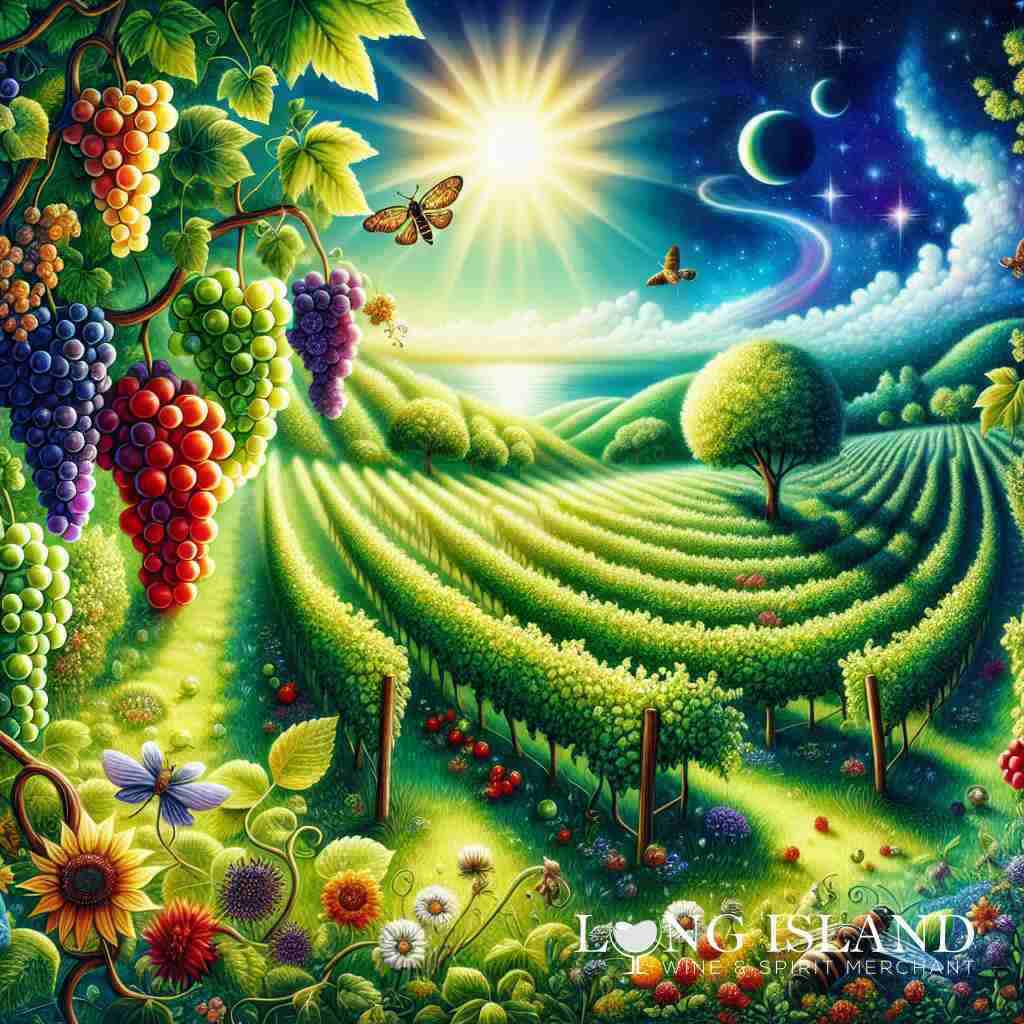
Embracing Earth-Friendly Wine Choices
How Choosing Biodynamic Wines Supports Eco-Friendly Practices
Opting for biodynamic wines is more than just selecting a bottle off the shelf; it’s a conscious decision to support eco-friendly practices that extend far beyond the vineyard. Biodynamic farming emphasizes an autonomous approach to agriculture, relying on composting, biodiversity, and natural pest management to maintain the health of the vineyard. By choosing these wines, consumers play an active role in promoting a farming ethos that respects the earth, minimizes waste, and reduces the need for synthetic chemicals that can harm the environment. Long Island Wine & Spirit Merchant offers a variety of biodynamic wines, providing an excellent avenue for individuals looking to make environmentally responsible choices without compromising on quality or flavor.
The Future of Wine: Sustainability on the Rise
As environmental concerns become increasingly paramount, the wine industry is experiencing a significant shift toward sustainable practices, with biodynamic farming at the forefront of this movement. This approach is not merely a trend but a sustainable evolution backed by a philosophy that aligns agricultural activity with the natural world. The integration of biodynamic methods demonstrates how the sector can adapt to and mitigate the impacts of climate change, ensuring the longevity and resilience of wine production. The emphasis on preserving biodiversity, soil vitality, and ecological balance heralds a future where the wine industry thrives in symbiosis with the planet. Long Island Wine & Spirit Merchant remains committed to this vision, highlighting the importance of sustainability through its carefully curated selection of biodynamic wines that reflect the best of the future of wine.
Why Biodynamic Wines Are Worth the Investment
Biodynamic wines offer an unparalleled taste experience that is as unique as it is eco-conscious. The meticulous care and attention to detail involved in biodynamic viticulture result in wines that are expressive, vibrant, and deeply reflective of their terroir. These wines are crafted under rigorous standards that ensure not only environmental stewardship but also exceptional quality. Investing in biodynamic wines is an investment in a sustainable future, in artisans who prioritize health and harmony for the earth, and in a product that stands out for its authenticity and quality. For those ready to explore the depth and diversity of biodynamic wines, Long Island Wine & Spirit Merchant provides an expansive selection, enabling consumers to experience the true essence of what makes biodynamic wines worth every sip and every penny.
In Vino Veritas: The Truth About Biodynamic Wine
Demystifying Common Myths About Biodynamic Wine
Biodynamic wine often finds itself shrouded in myths and misconceptions. A prevalent myth is that biodynamic wines are pricier organic wines without substantial differences in taste or quality, a notion far from the truth. Biodynamic farming goes beyond organic practices by treating the vineyard as a living organism and incorporating cosmic rhythms into the farming process. This holistic approach fosters a deep connection between the vineyard and its broader ecosystem, leading to wines that many argue possess a unique vibrancy and clarity of flavor.
Another common misunderstanding is around the use of biodynamic preparations, sometimes misrepresented as mystical or unscientific. However, these preparations, made from herbs, minerals, and manure, are used to enhance soil fertility and plant health, resting on principles of homeopathy. Critics sometimes regard the biodynamic calendar as pseudoscience. Yet, many winegrowers attest to the tangible benefits of aligning their agricultural activities with lunar and cosmic rhythms, observing notable improvements in plant growth and grape quality.
Exploring the science and successes behind these practices reveals the substance and tangible results that biodynamic farming delivers, challenging skeptics and enticing wine lovers toward a more nuanced understanding of what makes biodynamic wine distinct.
Personal Stories: Experiences with Biodynamic Wine
The essence of biodynamic wine extends beyond its agricultural roots to the personal experiences of those who produce and enjoy these exceptional wines. Winemakers who have transitioned to biodynamic practices often share stories of revelation and rejuvenation – how adopting these methods revived their land, vines, and wines. They talk about a marked difference in the biodiversity of their vineyards, from the soil to the insect life and the quality of the grapes produced. These narratives are complemented by the experiences of consumers who, whether through a blind tasting or a gradual introduction to biodynamic wines, remark on the depth and purity in flavor that sets these wines apart.
Among the enthusiasts of biodynamic wines are those who, initially skeptical, were drawn in by the environmental ethos and stayed for the distinctive taste profiles. Wine clubs and wine-tasting events centered around biodynamic wines provide platforms for sharing these stories, fostering a community that values sustainability, artisanal wine production, and the intricate relationship between the earth and the wines it can produce.
Taking the Biodynamic Journey: Where to Start
Embarking on the journey into biodynamic wines can be as enriching as it is delicious. For newcomers, understanding the certifications and symbols on wine labels is a helpful starting point. Looking for certifications from Demeter or Biodyvin guarantees that the wine meets strict biodynamic production standards. Exploring wine selections from reputable sources, such as Long Island Wine & Spirit Merchant, can help guide consumers toward high-quality biodynamic wines. Their staff often have first-hand knowledge of the wines and can provide recommendations based on preferences or curiosity.
Engaging with the community through wine tastings, either in-store or at vineyard events, offers an immersive way to experience the difference in biodynamic wines directly. Such events often provide a background on the vineyard’s practices, fostering a greater appreciation for the care and intention behind each bottle. For those looking to deepen their understanding, participating in workshops or seminars on biodynamic viticulture can illuminate the fascinating processes behind these wines.
Taking a wine taste quiz online tailored to biodynamic preferences can also be a playful yet informative way to begin. This personalized approach helps in narrowing down the vast world of biodynamic wines to those that will most likely resonate with an individual’s palate.
Ultimately, the journey into biodynamic wines is a personal adventure enriched by the stories, the science, and, most importantly, the savoring of wines that encapsulate the essence of their biodynamic origins.
Frequently Asked Questions
Question: What exactly does biodynamic wine mean, and how does it differ from organic wine?
Answer: Biodynamic wine represents a pinnacle of sustainable wine production, where the vineyard is treated as a self-sustaining ecosystem. Unlike organic wine, which focuses primarily on avoiding synthetic pesticides and fertilizers, biodynamic winemaking integrates holistic agricultural practices that include the use of herbal and mineral preparations and aligning vineyard activities with the lunar calendar. This approach enhances the biodiversity, soil fertility, and overall vitality of the vineyard, contributing to the production of wines that not only have a minimal ecological footprint but also exhibit a profound expression of terroir. At Long Island Wine & Spirit Merchant, we proudly curate a selection of biodynamic wines that embody these eco-friendly and artisanal wine-making values, offering our customers the chance to experience the unique character and superior quality of biodynamic wines.
Question: Can you tell me more about the certification process for biodynamic wines mentioned in “What Does Biodynamic Wine Really Mean?”
Answer: Biodynamic wine certification is a rigorous process that ensures vineyards and wineries meet stringent standards for sustainable and holistic farming practices. Certification bodies like Demeter and Biodyvin audit and verify that these practices are being followed, encompassing everything from the use of biodynamic preparations to enhance soil health to adhering to a planting calendar based on cosmic rhythms. Certification is a testament to a winery’s dedication to environmental stewardship and ecological winemaking. At Long Island Wine & Spirit Merchant, we recognize the importance of these certifications, and our collection features wines from certified biodynamic vineyards, ensuring our customers enjoy wine of the highest ethical and quality standards.
Question: How does biodynamic farming impact the flavor profile of a wine?
Answer: Biodynamic farming is known for its ability to produce grapes that reflect a true sense of place or terroir, resulting in wines with pronounced flavor profiles and exceptional purity. By fostering a balanced ecosystem and focusing on soil health, biodynamic vineyards tend to yield grapes that are more vibrant and expressive. The absence of chemical interference allows the natural characteristics of the grape and its surrounding environment to shine through, often leading to wines that are not only complex and nuanced but also more terroir-driven. For those interested in exploring wines that offer an authentic taste of their origins, Long Island Wine & Spirit Merchant provides an exquisite selection of biodynamic wines that showcase the unique qualities imparted by these holistic and sustainable farming practices.
Question: Are biodynamic wines more expensive than conventional ones?
Answer: While biodynamic wines can sometimes be priced slightly higher than conventional wines, the cost is reflective of the meticulous care, additional labor, and sustainable practices involved in biodynamic farming. The price point not only accounts for the quality of the wine but also supports the environmental stewardship and ethical farming methods inherent in biodynamic wine production. At Long Island Wine & Spirit Merchant, we believe in offering wines that provide exceptional value, including a carefully selected range of biodynamic wines. Our knowledgeable staff can help guide you to a biodynamic wine that fits your preferences and budget, ensuring that you can enjoy the unique benefits of eco-friendly and artisanal wines at various price points.
Question: How can I start exploring biodynamic wines?
Answer: Beginning your exploration of biodynamic wines is an exciting journey toward a more sustainable and holistic approach to wine-making and consumption. At Long Island Wine & Spirit Merchant, we recommend starting with a guided wine tasting or educational event focused on biodynamic practices. Our knowledgeable staff can also personalize recommendations based on your preferences, offering insights into the diverse world of biodynamic wines. Taking advantage of our wine taste quiz online can further help narrow down your choices by matching your flavor preferences with our curated selection. Whether you’re looking for a bold red or a refreshing white, our collection of biodynamic wines provides an exemplary starting point for anyone interested in experiencing the vibrant character and environmental benefits of biodynamically produced wines.


